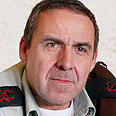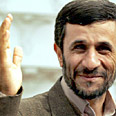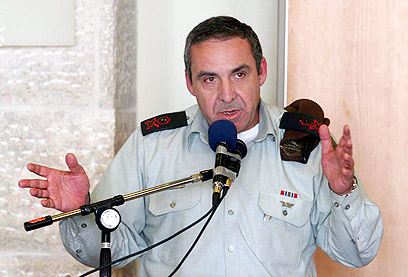

A nuclear Iran will pose an existential threat to Israel and could seriously endanger the security of European nations, Israel Defense Forces Deputy Chief of Staff Maj.-Gen. Moshe Kaplinsky warned Friday.
"A nuclear Iran is an existential threat to the State of Israel, which is likely to trigger some effects in the Middle East, like on unstable regimes. A nuclear Iran will bring a threat beyond the borders of Israel, maybe even Europe," Kaplinsky said.

IDF Deputy Chief of Staff Maj.-Gen. Moshe Kaplinsky (Photo: Gil Yochanan)
"We can identify some negative trends most of which are related to Lebanon and some started even before. The most dominant trend we should look at is a nuclear Iran, because they took a strategic decision to acquire nuclear capability," he said.
"My analysis shows that all the processes taking place in the international community with regards to Iran are meant to gain more time to create cracks in the international shield, as far as the Iranians are concerned," he added.
He added that Iran's political maneuvers for stalling time have been successful, citing the Islamic Republic's latest acquisition of anti-aircraft missiles from Russia and it attempts to seal arms sale deals with China.
He said Iran will eventually be able to acquire nuclear know-how.
'Withdrawal from Iraq dangerous'
Speaking before a group of local council leader he said: "Iran is trying to turn Syria into a protected ally and is strengthening its involvement there. Also in the Palestinian Authority. Iranian are assisting through funds, training, setting up terror groups and arms in Gaza and the West Bank … the more the link between Hizbullah, Syria, Iran and Hamas deepens we need to be more worried and aware."
About the Baker-Hamilton report he said: "I am not giving my opinion about the Baker report neither about US policy but I want to say that in my opinion of the strategy and the way in which the United States will choose to leave Iraq will have great influence on us and the whole region."
He said the influence over radical groups in moderate countries will depend on who rules Iraq. "World Islam has a general influence which poses a threat in Gaza, in the Palestinian Authority and the whole region," he said.
'Hizbullah preparing for second round'
He added that the war in Lebanon united moderate Arab states like Saudi Arabia, Egypt, Jordan and some Gulf states.
"Together we will find a common interest in restraining the axis of evil and radical elements," he said.
"The war in Lebanon brought about mixed trends in our region. Syria and Hizbullah continue to strengthen their forces and are arming for a second round," he said.
He said the IDF is rehabilitating its forces and drawing lessons from this summer's confrontation with Hizbullah in preparation for possible confrontations with the groups in the future.















